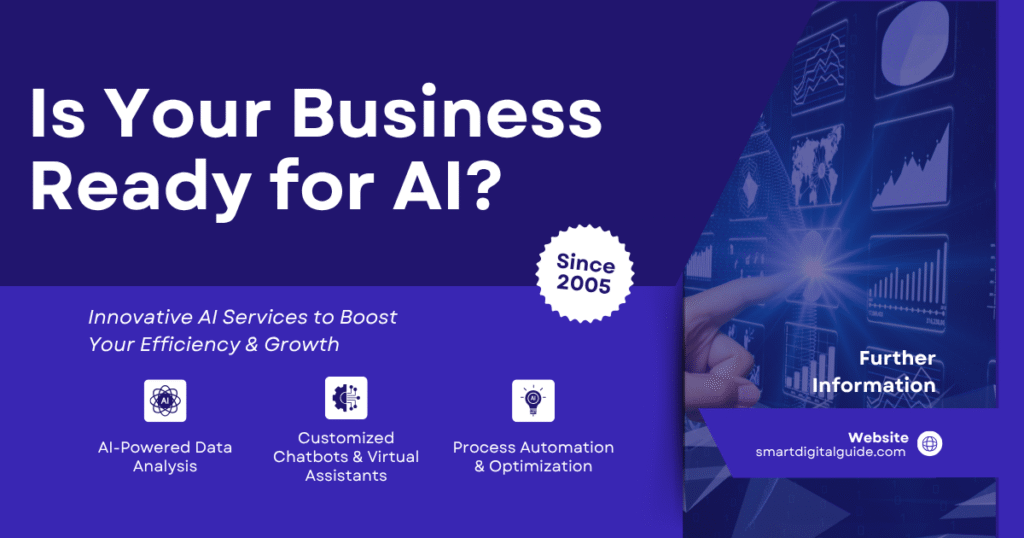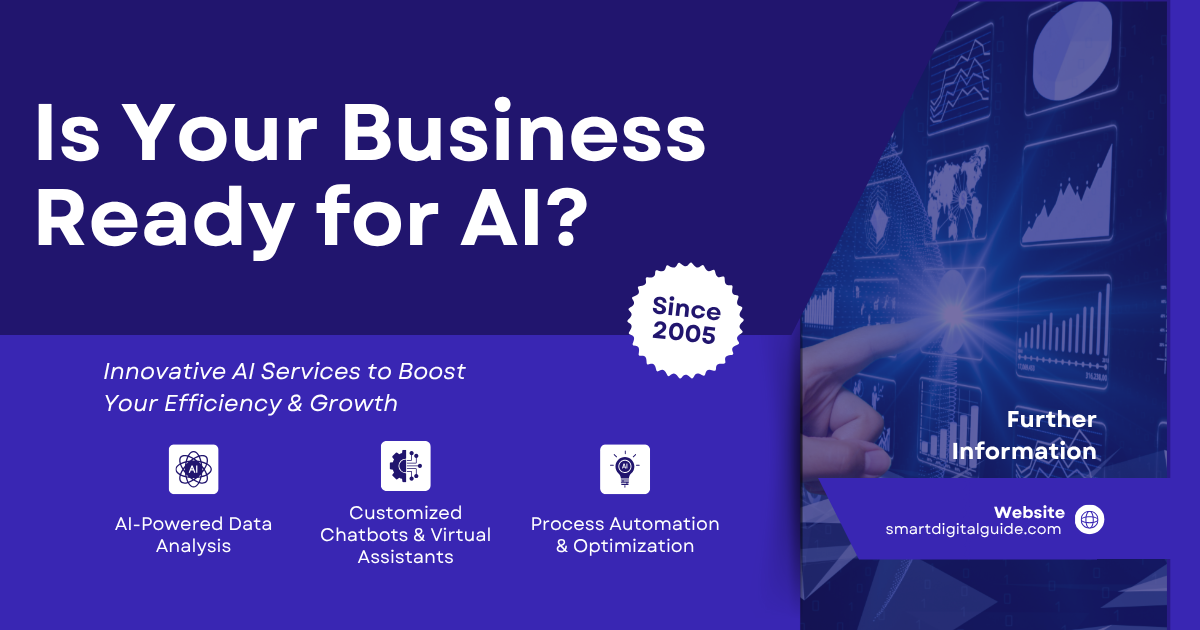Artificial Intelligence (AI) has transitioned from a concept of the future to an essential component of today’s business landscape. Companies, ranging from emerging startups to large multinationals, are adopting AI technology to automate processes, analyze information, improve customer interactions, and make more informed decisions. The pressing question is: Is your company equipped for AI? If you find yourself uncertain, it’s crucial to evaluate your readiness and make necessary preparations.

Comprehending the True Impact of AI on Business
AI does not signify machines taking over human roles or sophisticated devices replacing personnel. Rather, it focuses on leveraging data alongside algorithms to enhance decision-making, streamline repetitive tasks, and reveal new possibilities. This encompasses a variety of technologies such as machine learning, natural language processing, chatbots, and predictive analytics.
If you’re still dependent on manual processes, isolated data systems or antiquated customer service practices, those competitors who are already harnessing the power of AI may soon leave you behind.
Reasons Businesses Are Embracing AI in 2025
Here are several significant factors driving companies to invest in AI:
Enhanced Efficiency and Automation AI streamlines repetitive tasks such as data entry, customer service interactions, and managing inventories. This allows organizations to allocate time and resources toward more valuable initiatives.
Elevated Customer Experience AI-driven chatbots and recommendation systems facilitate personalized, instantaneous engagements that enhance user satisfaction and boost sales.
Data-Informed Decision Making AI technologies have the capability to sift through extensive datasets, revealing patterns and insights that enable leaders to make quicker and more confident decisions.
Cost Savings By optimizing processes and minimizing human errors, AI can lead to substantial cost reductions over time.
Strategic Advantage Businesses leveraging AI tend to be more adaptable, scalable, and innovative—key attributes necessary for success in today’s dynamic marketplace.
Indicators That Your Business Is Prepared for AI
Before diving into AI implementation, it’s essential to evaluate if your business is equipped for a successful transition. Consider these signs that indicate readiness:
You Have Digital Infrastructure If your organization utilizes cloud services, CRM platforms, or analytical tools, incorporating AI can be much smoother.
You Gather and Preserve Data AI relies heavily on data. If your enterprise routinely collects information about customers, sales figures, or operational metrics, you possess the necessary resources for AI algorithms.
Your Operations Are Expanding In cases where rapid growth leaves your team overwhelmed, AI can assist in automating tasks and handling the rising demands efficiently.
You’re Committed to Customer Engagement AI has the potential to boost personalization and improve communication channels, making it an excellent fit for businesses that emphasize customer satisfaction.
Steps to Get Your Business Ready for AI Implementation
Identify Your Business RequirementsAvoid jumping on the AI bandwagon merely for its popularity. Focus on genuine challenges that AI can address within your organization—such as enhancing customer service, detecting fraud, or improving inventory predictions.
Evaluate Your DataAssess both the quantity and quality of your data. Is it organized, easily accessible, and pertinent? If it’s lacking in any area, prioritize efforts to structure and manage it effectively.
Invest in Employee TrainingProvide education about AI for your workforce. Implement training programs so staff members comprehend the advantages, tools available, and how AI might influence their job functions.
Start with Pilot InitiativesExperiment with AI through projects that carry minimal risk but have significant potential benefits. For instance, deploying a chatbot on your website can serve as a valuable introduction to artificial intelligence.
Select Appropriate Tools and CollaboratorsDecide whether to utilize existing AI solutions or collaborate with specialized consultants; ensure that your choices are consistent with your business objectives and financial considerations.
Monitor Performance and Refine StrategiesAI requires ongoing attention; it’s not a “set-and-forget” solution. Regularly assess performance metrics, solicit feedback, and refine algorithms to support sustained success over time.
Challenges to Consider
While AI offers numerous advantages, its implementation is not without obstacles. Issues such as data privacy, ethical concerns, algorithmic bias, and resistance from employees frequently arise. It is crucial to establish clear AI policies, adhere to relevant regulations, and engage your team early in the adoption process to build trust and facilitate acceptance.
Practical Examples of AI Utilization in Business
Retail: Companies like Amazon leverage AI for personalized product recommendations, flexible pricing strategies, and optimizing warehouse operations. Healthcare: Medical facilities utilize AI for aiding diagnostics, forecasting patient outcomes, and improving administrative processes. Finance: Artificial intelligence plays a role in identifying fraudulent activities, automating trading practices, and offering tailored banking solutions. Marketing: Businesses employ AI tools to effectively reach their target audiences with appropriate messaging.
Concluding Remarks
Artificial Intelligence is reshaping the operations of businesses, yet it isn’t a cure-all solution. The effective implementation of AI relies on sound strategy, accurate data, and an organizational culture that fosters innovation. Consider these questions: Are you gathering the appropriate data? Is your technological infrastructure capable of scaling? Are your teams prepared to utilize AI tools effectively?
If you can answer “yes” to most of these inquiries, then well done—your business is primed for AI adoption. If not, begin developing that readiness immediately. In the competitive environment of 2025 and beyond, integrating AI will be crucial rather than optional.









